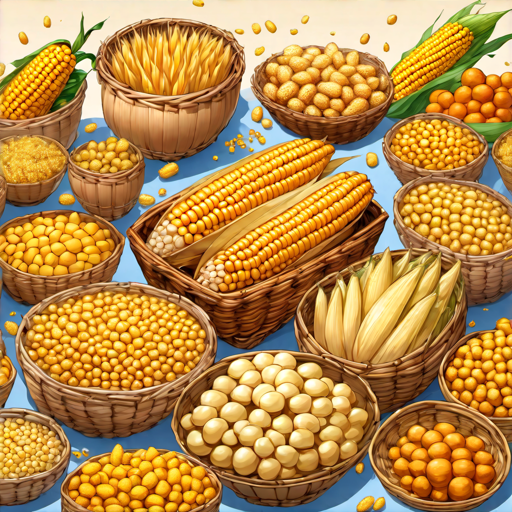Maize farming holds great significance within Nigeria and the wider African agricultural sector. Not only does it serve as a pivotal crop for nourishment, but it also plays a vital role in generating income for smallholder farmers. Nigeria, proudly holding the title of Africa’s largest maize producer and ranking 14th globally, showcases its commitment to this agricultural endeavor. Maize is cultivated throughout the country, with notable production hubs situated in both the Northern and Southern regions. Impressively, Nigeria achieved a noteworthy milestone in 2019, surpassing the production output of the previous year by generating over 11 million metric tonnes of maize.
Maize farming serves as a fundamental pillar for sustenance, catering to the dietary needs of humans and animals alike. Beyond its role in nourishment, maize holds immense versatility and finds application across diverse industries. As a vital raw material, it plays a central role in the production processes of key sectors, including food and beverage, pharmaceuticals, and textiles. The cultivation and production of maize possess substantial potential to fuel economic growth and bolster the development of Nigeria and the wider African economies.
Beyond its role as a valuable source of carbohydrates, fiber, vitamins, and minerals, maize offers a myriad of health advantages to the human body. Consumption of maize provides a substantial energy boost while fortifying the immune system and reinforcing both brain and heart health. Its inclusion in the diet aids in regulating blood pressure, enhancing vision, preventing of birth defects, and facilitating weight management endeavors.
The planting and harvest seasons for maize in Nigeria exhibit variation, contingent upon the specific location and prevailing climatic conditions. Typically, the maize planting season commences in either March or April and extends until May or June. Subsequently, the harvest season unfolds from August or September, continuing through November or December. Notably, in the northern region of Nigeria characterized by a dry and arid climate, maize cultivation aligns with the rainy season, typically spanning from June to September.
In the southern part of Nigeria, where the climate is humid, maize can be planted during both the rainy and dry seasons. This strategic timing allows farmers to leverage the water availability and optimize the growth and yield of maize crops in these arid zones.

How To Plant, Grow & Harvest Maize In Nigeria or Africa
- Optimal Variety Selection: Within Nigeria and Africa, an array of maize varieties awaits, each possessing distinctive merits and drawbacks. To ensure success, it is necessary to meticulously select a variety that harmonizes with the unique characteristics of your specific region, including considerations such as soil composition, climatic conditions, and resilience against pests and diseases.
- Land Preparation: Prior to planting, thorough land preparation is vital. Clearing the area of vegetation and debris sets the stage for optimal growth. Given maize’s substantial nutrient requirements, conducting soil tests becomes imperative in order to ascertain the precise amount and type of fertilizer to administer. Augmenting soil fertility can further be achieved by incorporating organic matter, such as well-composted manure.
- Optimal Timing and Planting Depth: Maize flourishes when sown during the rainy season, when the soil retains sufficient moisture. Planting too prematurely or belatedly may compromise yields. To ensure successful germination and consistent emergence, maize seeds should be planted at an ideal depth of approximately 5-8 cm inorder to avoid subpar germination rates and irregular sprouting.
- Diligent Weed Control and Vigilance Against Pests and Diseases: Weeds pose a significant threat to maize, as they vie with the plants for vital resources such as nutrients, water, and sunlight. Consistent and timely weeding practices serve to maintain a pristine field, minimizing competition and maximizing maize growth. Additionally, maize is prone to an assortment of pests and diseases, hence regular surveillance and effective management strategies are crucial in mitigating potential damage and minimizing losses.
- Careful Harvesting, Thorough Drying, and Adequate Storage: Typically, maize reaches its optimal harvest stage approximately 3-4 months after planting. Premature or delayed harvesting can compromise both quality and overall yields. Following the harvest, it is vital to subject the maize to a drying process, reducing its moisture content to a range of 13-15%. This critical step safeguards against spoilage during storage. Furthermore, maintaining proper storage conditions after drying is paramount.
Business Opportunities In Maize Farming In Nigeria and Africa
Maize farming plays a pivotal role in fostering rural development across Africa. Not only does it generate substantial employment opportunities, but it also acts as a catalyst for economic growth within rural communities. Its multifaceted impact extends beyond mere agriculture, making it a vital driver of progress in Nigeria and African to create opportunities such as:
- Maize processing: Maize processing presents a remarkable business opportunity for entrepreneurs as it entails the transformation of raw maize into a diverse range of finished products, including maize flour, corn flakes, and maize grits. This value-added process opens doors to innovative ventures and entrepreneurial endeavors.
- Sale of maize seeds and agricultural inputs: Seizing the opportunity in maize farming extends beyond cultivation to encompass the production and sale of premium maize seeds and agricultural inputs. Entrepreneurs can venture into the realm of high-quality seed production, supplying fellow farmers with seeds for successful yields. Moreover, establishing a business dedicated to offering a comprehensive range of agricultural inputs, including fertilizers, pesticides, and herbicides, they become a catalyst for enhanced productivity among maize farmers.
- The production and sale of maize-based snacks: This presents a lucrative business opportunity, particularly in Nigeria and across Africa. The undeniable popularity of snacks like popcorn, chips, and roasted maize creates a thriving market for enterprising individuals. By venturing into this realm, entrepreneurs can capitalize on the widespread demand for these delectable treats, offering consumers a diverse range of maize-based snacks.
- Maize storage, transport, and warehousing services: This presents strategic opportunities for maize farmers to optimize their operations and maximize profitability. By investing in storage and warehousing facilities, farmers can effectively preserve maize during the off-season, strategically timing its sale when market prices are favorable. Furthermore, entrepreneurs can extend their ventures by offering transportation and logistics services to both maize farmers and traders, facilitating the smooth movement of products from farms to markets.
- Maize trading: Maize trading presents a compelling business opportunity for individuals seeking entrepreneurial ventures. This venture revolves around the buying and selling of maize as a commodity. As a maize trader, you can capitalize on the price difference between the purchase and sale of maize, thereby generating profits.

Target Market For The Maize Farming Business In Nigeria or Africa
Maize Products offer a multitude of avenues and platforms for effective marketing. These products can be successfully marketed through diverse channels such as direct selling, farm-to-table restaurants, export, cooperative marketing, contract farming, value addition, and government procurement. However, to precisely identify the target market, conducting a thorough market analysis is imperative. The target market for maize farming businesses in Nigeria or Africa encompasses the following:
- Local Food Markets: Within many African nations, including Nigeria, maize serves as a staple food. As a result, local food markets stand as a primary target for maize farmers, given their reliance on maize as a fundamental food source. Maize finds its way into the preparation of a diverse range of meals, including pap, akamu, eko, and tuwo masara, among others.
- Animal Feed Production: Maize plays a crucial role as a key ingredient in animal feed production throughout Nigeria and Africa. Poultry, pigs, and other livestock rely on maize as a vital component of their diet, ensuring their overall health and optimal weight.
- Industrial Use: Maize finds application in diverse industries, such as the pharmaceutical and paper industry, among others. This versatility opens up opportunities for maize farmers to target these sectors as potential buyers for their maize produce.
- Export Markets: The export market for maize in Nigeria and Africa is experiencing notable growth. This presents a lucrative opportunity for maize farmers to tap into international buyers and exporters as potential customers for their maize produce.
Nigeria possesses a distinctive comparative advantage in maize production, signifying the potential for significant growth in export earnings from this crop. By channeling the appropriate investments, implementing favorable policies, and providing vital support, maize farming holds the power to alleviate poverty, generate employment opportunities, and foster robust economic growth not only in Nigeria but also across Africa. Embracing the immense potential of maize farming and harnessing its benefits can contribute to a more prosperous and sustainable future, driving positive socioeconomic transformation in Nigeria and the broader African economy.
Sources




